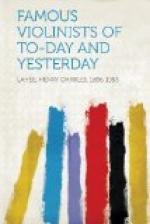Sivori was a man of generous impulses, and was seldom appealed to in vain to assist in a good cause. When his teacher, M. Dellepaine, was taken ill and was unable temporarily to fill his post of first violin at the theatre, and of director of the conservatoire at Genoa, Sivori replaced him in both and gave him the entire benefit of his services. After two years the teacher died, and Sivori still held the two places an entire year for the benefit of the widow, until a situation was procured for her which enabled her to live without further assistance.
At one time Sivori felt that the instrument which he played was not so perfect as to satisfy him. He asked Paganini to sell him one, and the reply was, “I will not sell you the violin, but I will present it to you in compliment to your high talents.” Sivori travelled to Nice to receive the instrument from his master’s own hands. Paganini was then—it was in 1840—in a deplorable condition, and could hardly speak. He signified a desire to hear his pupil play once more, and Sivori, withdrawing to a room a little way off, so that the sound of the instrument would not be too loud, played whatever Paganini called for. About two weeks later Paganini died.
In 1851 Halle wrote of him as follows:
“Sivori was here lately, but caused little furore; such rubbish as the man plays now I had never heard, and really, as an artist, felt ashamed of him.”
Sivori continued to play in public until 1864, when he visited London and played at the Musical Union and elsewhere, but his triumph in Paris in 1862 must not be forgotten. On that occasion he executed Paganini’s B minor concerto, and aroused immense enthusiasm, although he played immediately after Alard, who was at that time a prime favourite. During his later years Sivori lived in retirement, and he died February 18, 1894.
He was the first person allowed to play on the celebrated violin which Paganini bequeathed to the city of Genoa. He was also the first to play, with orchestra, Mendelssohn’s Violin Concerto in England. This performance was at the Philharmonic Society concert, June 29, 1846.
Henry Vieuxtemps was one of the greatest violinists of his time. He was born at Verviers, in Belgium, in 1820, and was brought up in a musical atmosphere. So early did his talent develop, that he played a concerto of Rode in public at the age of six, and the following year made a tour with his father and his teacher, Lecloux, during which he had the good fortune to meet De Beriot, before whom he played. During four years he remained a pupil of De Beriot, and when that artist left Paris, in 1831, Vieuxtemps went to Brussels, where he practised hard, but without a teacher, until 1833, when he again set out on a prolonged concert tour.
From this time on he seems to have spent the greater part of his time in travelling, for which he had a passion. He visited all parts of Europe and met most of the celebrated musicians of the day. Spohr, Molique, Schumann, Paganini, Henselt, and Richard Wagner were among the celebrities whom he met, and in his tours he was associated with Servais, Thalberg, and other well-known artists.




